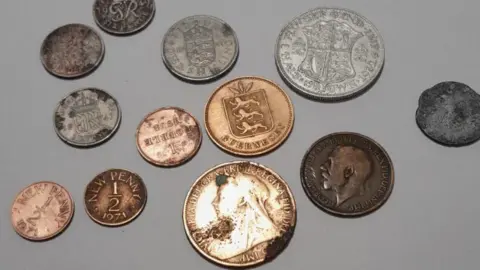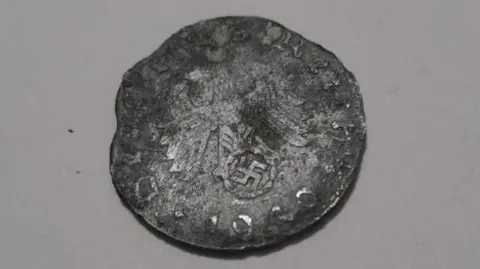Coins spanning a century found in pub renovation
 Paul Stockreiter
Paul StockreiterCoins from the Victorian era, the German Occupation of Guernsey and up to the 1970s have been found during the refurbishment of a pub.
They were discovered by carpenter Paul Stockreiter during the redevelopment of La Fontaine Inn, on Vale Road, which started earlier in January.
Shane Le Page, from the Guernsey Heritage Keepers - a non-profit metal detecting group, said: "I believe it's just a mixture of coins that's probably just slipped under the floor boards or gaps over the years."
He said: "The Queen Victoria Penny - late 1800s - is the oldest and all the other coins running through to 1971... so the history of the occupants of the building."

Mr Le Page said it was not unusual to find coins, cigarette packs, food packaging, newspapers, bottles, receipts, books and other items either from when the buildings were built or in the intervening time.
He said the coin from the German Occupation of the island was made of cheap metal as most coins were during World War Two.
On the coin can be seen the Reichsadler, heraldic eagle, on top of a swastika and the date 1940 along with some of the letters of Deutsches Reich around the edge.
Mr Le Page said there was little value in the coins other than "historical importance".
"Because of the Fontaine Inn pub it tells a bit of a story through the decades, of the building and the proprietors that used to come here."

Carpenter Paul Stockreiter was working at the pub when he found the coins.
"Once we ripped the bar out we found the joints were rotten, so we lifted the floorboards," he said.
"It's an old building, there is no damp course, no concrete, the floor below is mud basically.
"As we revealed it, on the mud the coins just looked like a muddy disk, they were so covered in debris."
Mr Stockreiter added: "I find it interesting, you imagine who came in, what they were ordering, what they were drinking?
"Was it quarryman, did he part with all his wages? You don't know and it brings it to life for me."
 Paul Stockreiter
Paul StockreiterFollow BBC Guernsey on X and Facebook. Send your story ideas to [email protected].
